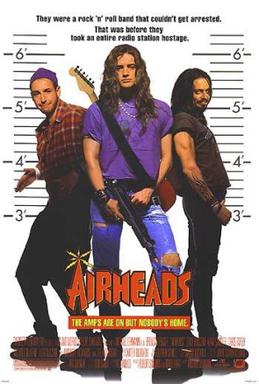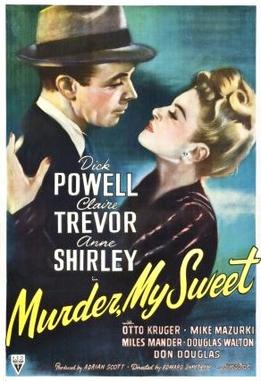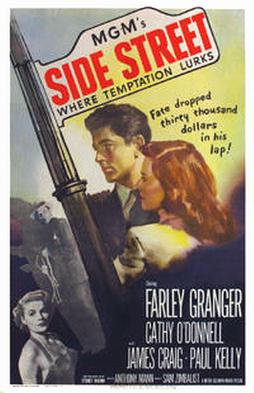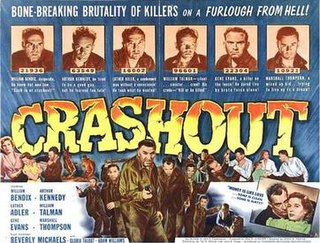
Crossfire is a 1947 American film noir drama film starring Robert Young, Robert Mitchum and Robert Ryan which deals with the theme of anti-Semitism, as did that year's Academy Award for Best Picture winner, Gentleman's Agreement. The film was directed by Edward Dmytryk and the screenplay was written by John Paxton, based on the 1945 novel The Brick Foxhole by screenwriter and director Richard Brooks. The film's supporting cast features Gloria Grahame and Sam Levene. The picture received five Oscar nominations, including Ryan for Best Supporting Actor and Gloria Grahame for Best Supporting Actress. It was the first B movie to receive a Best Picture nomination.

Above the Law is a 1988 American crime action thriller film cowritten, coproduced and directed by Andrew Davis. It marked the film debut of Steven Seagal, who was also a producer, and stars Pam Grier, Sharon Stone, Ron Dean and Henry Silva. Seagal plays Nico Toscani, an ex-CIA agent, Aikido specialist and a Chicago policeman who discovers a conspiracy upon investigating the mysterious shipment of military explosives seized from a narcotics dealer.

The Hitch-Hiker is a 1953 American film noir thriller co-written and directed by Ida Lupino, starring Edmond O'Brien, William Talman and Frank Lovejoy, about two friends taken hostage by a hitchhiker during an automobile trip to Mexico.

The Blue Dahlia is a 1946 American crime film and film noir with an original screenplay by Raymond Chandler directed by George Marshall and starring Alan Ladd, Veronica Lake and William Bendix. It was Chandler's first original screenplay.

Airheads is a 1994 American comedy film directed by Michael Lehmann and written by Rich Wilkes. It stars Brendan Fraser, Steve Buscemi, and Adam Sandler as the members of a struggling rock band who hijack a Los Angeles radio station in order to get their demo aired. The supporting cast includes Chris Farley, Michael McKean, Judd Nelson, Michael Richards, Joe Mantegna, Ernie Hudson, Amy Locane, Nina Siemaszko, Marshall Bell, Reg E. Cathey, and David Arquette.

Murder, My Sweet is a 1944 American film noir, directed by Edward Dmytryk and starring Dick Powell, Claire Trevor and Anne Shirley. The film is based on Raymond Chandler's 1940 novel Farewell, My Lovely. It was the first film to feature Chandler's primary character, the hard-boiled private detective Philip Marlowe.

Fear in the Night is an American 1947 film noir crime film directed by Maxwell Shane, starring Paul Kelly and DeForest Kelley. It is based on the Cornell Woolrich story "And So to Death". Woolrich is credited under pen name William Irish. The film was remade by the same director in 1956 with the title Nightmare this time starring Edward G. Robinson playing the cop and Kevin McCarthy.

Gil Bellows is a Canadian actor, screenwriter, and director. He is best known for the roles of Tommy Williams in the 1994 movie The Shawshank Redemption, Billy Thomas in the Fox television series Ally McBeal (1997–2002), and CIA agent Matt Callan in the CBS television series The Agency (2001–2003). In 2016–2017, he was a regular cast member in the USA Network series Eyewitness.

Phantom Lady is a 1944 American film noir directed by Robert Siodmak and starring Franchot Tone, Ella Raines, and Alan Curtis. Based on the novel of the same name by Cornell Woolrich, it follows a young Manhattan secretary and her endeavors to prove that her boss did not murder his wife.

Sam Levene was a Russian-American Broadway, films, radio, and television actor and director. In a career spanning over five decades, he appeared in over 50 comedy and drama theatrical stage productions. He also acted in over 50 films across the United States and abroad.

Side Street is a 1949 American film noir/police procedural starring Farley Granger and Cathy O'Donnell. Directed by Anthony Mann, the picture was filmed on location throughout New York City and culminated in one of the first modern car chases. Part of the story is set in the vicinity of the long-demolished Third Avenue El, a favorite location of the films made in the city during that era.

Crashout is a 1955 American film noir crime film directed by Lewis R. Foster and starring William Bendix, Arthur Kennedy, Luther Adler, William Talman, Gene Evans, Marshall Thompson, and Beverly Michaels.
Naked Alibi is a 1954 American film noir crime film directed by Jerry Hopper and starring Sterling Hayden, Gloria Grahame and Gene Barry. It was released on October 1, 1954 by Universal-International. Portions of the film were shot in Tijuana.

The Dark Past is a 1948 American film noir psychological thriller film starring William Holden, Nina Foch, and Lee J. Cobb. Directed by Rudolph Maté, the Columbia Pictures release is a remake of Blind Alley (1939), also released by Columbia, and based on a play by American dramatist James Warwick.

Shocker is a 1989 American supernatural slasher film written and directed by Wes Craven, and starring Michael Murphy, Peter Berg, Cami Cooper, and Mitch Pileggi. The film was released by Universal Pictures on October 27, 1989, and grossed $16.6 million.

Police Academy is a 1984 American comedy film directed by Hugh Wilson in his directorial debut, and distributed by Warner Bros. Pictures. Its storyline follows a new recruitment policy for an unnamed city's police academy to take in any recruit who wishes to apply and study to become a police officer. The film stars Steve Guttenberg, Kim Cattrall, and G.W. Bailey.

Tobor the Great is a 1954 independently made American black-and-white science fiction film, produced by Richard Goldstone, directed by Lee Sholem, and starring Charles Drake, Karin Booth, and Billy Chapin. The film was written by Carl Dudley and Philip MacDonald and was distributed by Republic Pictures.

Split Second is a 1953 American film noir thriller directed by Dick Powell about escaped convicts and their hostages holed up in a ghost town, unaware of the grave danger they are in. It features Stephen McNally, Alexis Smith, Jan Sterling, and Keith Andes. It was the only film put into production by the consortium that took over RKO Pictures in late 1952 before previous owner Howard Hughes resumed control of the company. Location shooting took place in the Mojave Desert.

The Scarlet Hour is a 1956 American film noir crime film directed and produced by Michael Curtiz, and starring Carol Ohmart, Tom Tryon, and Jody Lawrance. It was distributed by Paramount Pictures. Curtiz had previously directed such noted films as Casablanca, Yankee Doodle Dandy, and White Christmas. The screenplay was based on the story "The Kiss Off" by Frank Tashlin. The song "Never Let Me Go", written by Jay Livingston and Ray Evans, is performed by Nat King Cole. UCLA has an original 16 mm copy of the film in its Film and Television Archive.

The Night Holds Terror is a 1955 American crime film noir based on a true incident, written and directed by Andrew L. Stone and starring Vince Edwards, John Cassavetes and Jack Kelly.



















